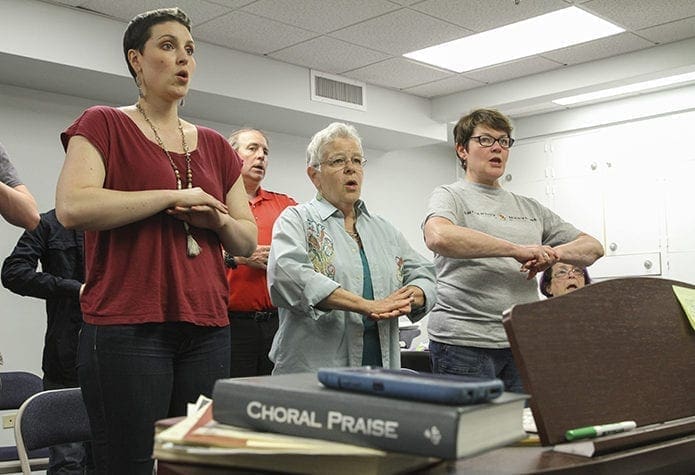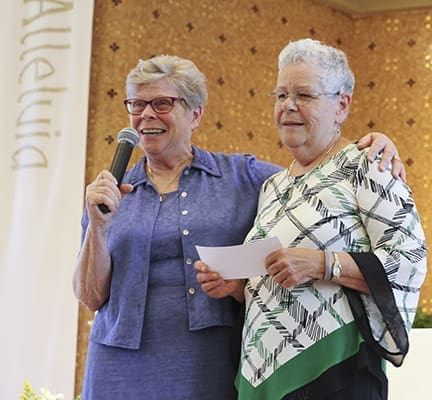 Photo By Michael Alexander
Photo By Michael AlexanderDecatur
Adrian Dominican Sister Mary Priniski remembers an ‘amazing 50 years’
By PRISCILLA GREEAR, Special to the Bulletin | Published October 23, 2018
DECATUR—Adrian Dominican Sister Mary Priniski, Ph.D., has devoted her life to advocating for the rights of workers and the marginalized, first inspired by a 1971 Vatican synod that declared social justice a constitutive element of the Gospel.
Now in her 50th year of religious life, she perseveres in her labors with new vigor as interim executive director of Emory University’s Aquinas Center of Theology.
She is also coordinator of Gathering for Mission, a five-year project of the Catholic Committee of the South, to realize Pope Francis’ social justice vision.
Now 69, Sister Mary celebrated her golden jubilee with a Mass and luncheon in May at St. Thomas More Church in Decatur, where she sings in the choir. She celebrated again with sisters at the congregation’s motherhouse in Michigan.
It’s been a year to remember all her “wonderful opportunities” that came through her vibrant religious community, she said in a recent telephone interview.
“When you are open to what the Divine has in store for you, things just fall into your lap. The ministries in which I’ve been involved have had doors just open. Thus it’s been clear what and where I need to be next,” said Sister Mary.
“If you’re open to hearing the Spirit wherever you find it—which as the pope says is not only within the church but beyond—your life is very full, and it’s been an amazing 50 years,” she said. “If I hadn’t been in the congregation for 50 years, I’d never be doing what I’m doing now or be in Georgia for that matter. Those of us who are members of religious congregations have tremendous opportunities to respond to the needs of the people of God.”
These days Sister Mary travels the Southeast and beyond in her Ford Focus to implement Gathering for Mission. She leads dialogues with all levels of church leadership on Pope Francis’ vision for engagement with other Christian denominations and with non-Christian religions and society at large. Discussions take on new urgency in providing a space to address topics such as the sex abuse crisis in the church and communion of people across cultures and generations.
“The project is engaging church leadership on all levels in the voice and vision of Pope Francis, and I think we have an opportunity now to really help the church in his vision of being a church of the poor and for the poor. In some ways I’ve been doing that my whole life and in some ways having Pope Francis to back me up on that is great,” said Sister Mary, who recently participated in the Atlanta archdiocesan priests’ convocation.
In his apostolic exhortation on evangelization, titled “The Joy of the Gospel,” Pope Francis “has laid out a vision for the church,” she said. “It’s very much how do we become a church that reaches out to those beyond our walls, particularly those who are marginalized and on the periphery in our society.”
She remains steadfast as the world spotlights Vatican handling of clergy sexual abuse. Pope Francis “has made mistakes as we all do. He admits when he’s wrong and tries to make amends and change the ways the church handles things,” she reflected. “I would hope that I could be as humble as he has been in admitting when I am wrong.”
Days of dialogue are now underway in five dioceses.
“It’s an exciting time,” she said. “In the places we’ve done them people have been extremely pleased and challenged because dialogue is not easy.”
Inspired by joy
Growing up in Michigan, Sister Mary was taught by the Adrian Dominicans. It was their joyful spirit that inspired her to join the congregation. A graduate of the University of Detroit, she earned a master’s degree in health care mission from the Aquinas Institute of Theology in St. Louis, Missouri, and a doctorate in missiology from the Union Institute of Cincinnati, Ohio. Even as she questioned in her 20s whether she wanted to have children, she forged ahead full throttle in her Dominican vocation and persevered amidst the steady decline in religious ranks over the decades since the boom of the 1950s.

Sister Mary Jane Lubinski, OP, left, chapter prioress of the Adrian Crossroads Chapter of the Adrian Dominican Sisters, shares some words about Sister Mary Priniski, OP, right, just before Sister Priniski renews her vows before the congregation at St. Thomas More Church, Decatur, May 6. Sister Priniski was commemorating the 50th anniversary of her entrance into the congregation. Photo By Michael Alexander
She began her first advocacy position in the late 1970s with Southerners for Economic Justice. She garnered community and church support for J.P. Stevens’ textile workers unionizing in South Carolina. She lived in Atlanta from 1993-2001 serving as director of the Glenmary Research Center, focused on mission territories in Appalachia and beyond. Later she became director of their commission on justice in Atlanta and then worked for the Service Employees International Union in Washington for seven years. She laments contemporary “serious attacks on the rights of workers,” starting with “right to work” laws in many states that weaken unions, the near extinction of pensions and the struggle of families for a living wage. Her labors continue a longstanding religious tradition, Sister Mary said.
“Women religious have always stood up for the underdog,” she said. “You know that because they started schools in areas where kids weren’t getting education and they established hospitals and processes for health care in areas where people needed it, so that’s all part of the same tendency.”
“As we have become more engaged in broader political society, we’ve become more articulate about social justice, particularly since Vatican II, when we were encouraged to open up the doors, the windows and let the fresh air in and see what is going on in society,” she said. “The hopes and grief of society ought to be the hopes and grief of the church, and I think we’ve taken that to heart.”
Glenmary Brother Larry Johnson has worked with Sister Mary for nearly 38 years and said that the sharp sister’s polite persistence, genuine charm and giving spirit serve her well in engaging clergy. She builds relationships well, including with those of other cultures and races, having once led a Glenmary ministry with Native Americans, African-Americans and Hispanics.
“She’s very competent, very engaged and smart and meets people well,” he said. “She’s well connected and good with networking and organizing. … Sister Mary is one person if she asks me to do something, I’ll do it.”
Opportunities of faith
After returning to Atlanta in 2009, Sister Mary began serving on the board of the Aquinas Center, founded by Dominicans. Now she leads the center in its mission to bring a Catholic intellectual presence—ecumenical in spirit—to Emory and the archdiocese. The center’s Sept. 18 speaker was Cardinal Kurt Koch, president of both the Pontifical Council for Promoting Christian Unity and the Pontifical Commission for Religious Relations With the Jews.
“It’s an academic setting, so we’re trying to learn about what the thinkers of the church are saying and doing. I find that exciting,” she said.
Program coordinator Alice Cameron said that Sister Mary provides strong leadership and “radiates joy on a daily basis.”
“She is such a thoughtful leader and she takes special consideration of each person’s unique gifts and their strengths when she works with somebody. And she’s intrinsically helpful and she’s very focused and motivating,” said Cameron. “She’s done an excellent job of focusing the Aquinas Center’s purpose and redefining that as we go forward.”
As she engages with people throughout the South, the introvert also treasures quietude and relaxation, having knitted baby afghans for all the children of her 16 nieces and nephews. While there’s only one other Adrian Dominican now serving in Atlanta, she enjoys the archdiocese’s theological and spiritual vibrancy and fellowship.
“For women religious in particular, there are not a lot of us here for the size of the diocese. There’s a lot of camaraderie with the sisters so that’s really good too. And Georgia is a challenging state politically so it brings a level of challenge that is good for us, causes us to be creative in how we engage with people,” she said. “There are so many opportunities for us here as a church to be engaged in the community and to bring the faith to the community of Atlanta.”
Sister Mary believes God still calls women to consecrated life and that the form will evolve as God directs it.
“People join because they are called. There are so many opportunities for personal growth, for spiritual growth, for ministerial growth,” she said. “I wouldn’t change my life. As they say, ‘it’s been a great ride.’”